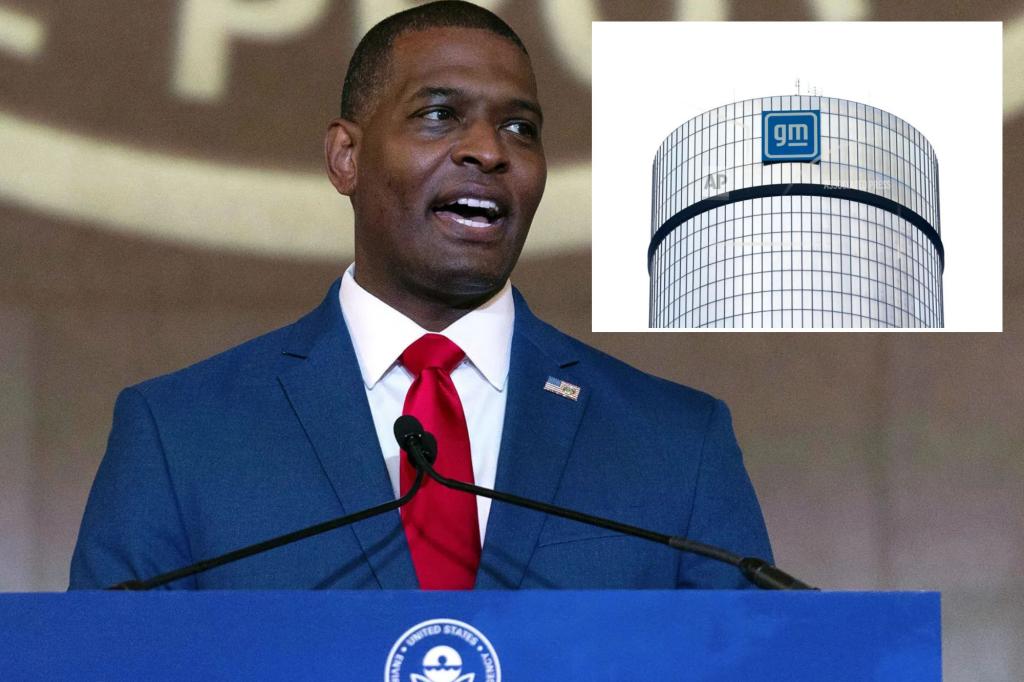General Motors must pay nearly $146 million in fines to the federal government because 5.9 million of its older vehicles fail to meet emissions and fuel economy standards.
The National Highway Traffic Safety Administration said in a statement Wednesday that certain GM vehicles from model years 2012 through 2018 did not meet federal fuel economy requirements.
The fine comes after the Environmental Protection Agency said tests showed GM’s pickup trucks and SUVs emitted an average of more than 10 percent more carbon dioxide than GM claimed in its initial compliance tests.
According to the EPA, the vehicles remain on the road and cannot be repaired.
According to the EPA, GM vehicles consume at least 10 percent more fuel on average than the figures on their window stickers indicate, but the company does not have to lower the miles per gallon figure on the stickers.
“Our investigation has led to accountability and supports an important program that reduces air pollution and protects communities across the country,” said EPA Director Michael Regan.
GM said in a statement that it complied with all regulations regarding pollution and mileage certification of its vehicles.
The company says it made no mistakes and did not fail to comply with the Clean Air Act.
According to GM spokesman Bill Grotz, the problem is caused by a change in testing procedures the EPA implemented in 2016.
According to Grotz, owners do not need to take any action because there are no defects in the vehicles.
“We believe this voluntary action is the best way to resolve the outstanding issues with the federal government,” he said.
According to the EPA, the enforcement action affects approximately 4.6 million full-size pickup trucks and SUVs and approximately 1.3 million midsize SUVs.
Affected models include the Chevy Tahoe, Cadillac Escalade and Chevy Silverado. About 40 variations of GM vehicles are affected.

According to the EPA, GM will be forced to give up credits that are used to ensure manufacturers’ greenhouse gas emissions remain below emissions standards for that model year.
GM, in a quarterly report to the Securities and Exchange Commission, expects the total cost of resolving the matter to be $490 million.
Because GM agreed to address the excess emissions, the EPA said it was not necessary to make a formal determination on the reasons for the excess pollution.
But David Cooke, senior vehicle analyst for the Union of Concerned Scientists, questioned how GM could not have known that the pollution levels in the first test were more than 10 percent higher than the values in the original test, given that the problem was so widespread and affected so many different vehicles.
“You don’t just make a rounding error of more than 10%,” he said.
Dan Becker, director of the Safe Climate Transport Campaign for the environmental organization Center for Biological Diversity, said GM’s violations “show why automakers cannot be trusted to protect our air and health, and why we need strong pollution regulations. Supreme Court, take note!”
In the past, automakers have been fined under the Clean Air Act for similar violations in similar pollution cases, which normally involve the Justice Department, Cooke said.
For example, Hyundai and Kia faced a lawsuit from the Department of Justice in a similar case.
The Justice Department declined to comment, and GM said the settlement resolves all of the government’s claims.
According to Cooke, it’s possible that GM owners will sue the company because their cars get worse fuel economy than advertised.
In 2014, Hyundai and Kia reached a settlement that required them to pay a $100 million fine to end a two-year investigation into inflated fuel economy ratings on window stickers of 1.2 million vehicles.
The affiliated Korean automakers deny breaking the law.
Hyundai said the high mileage was due to a misinterpretation of the EPA’s complex testing rules.
In 2015, Volkswagen admitted that it had deliberately rigged nearly half a million cars to bypass U.S. smog tests.
The German company admitted it deliberately installed software programmed to “bypass” emissions tests, allowing cars to be driven more powerfully on the road while emitting up to 40 times the legal pollution limit.
The scandal cost Volkswagen more than $30 billion in fines and settlements and led to two American executives being sent to prison.
